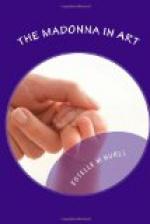The progress of painting, and the growing love of beauty, at length wrought a change. The time came when art saw the possibility of uniting, with the religious conception of previous centuries, a more natural ideal of motherhood. Thus, while the Madonna continues to be preeminently a witness of her son’s greatness, it is not at the sacrifice of motherly tenderness.
In Venetian art-history, Giovanni Bellini stands at the period when the old was just merging into the new. We have already seen how greatly he and his contemporaries differed from the painters of a later time. Taking advantage of all the progressive methods of the day, they did not relinquish the religious spirit of their predecessors, hence their work embodies the best elements of the old and new. As we examine the Bellini Madonnas, one after another, we can not fail to notice how delicately they interpret the relation of the mother to her child.
Loving and gracious as she is, she is not the Mater Amabilis: she is too preoccupied, though not too cold for caresses. Neither is she the Madre Pia, though by no means lacking in humility. Her thoughts are of the future, rather than of the present. True to a mother’s instinct, she encircles her child with a protecting arm, but her face is turned, not to his, but to the world. Both are looking steadfastly forward to the great work before them. Their eyes have the far-seeing look of those absorbed in noble dreams. Their faces are full of sweet earnestness, not of the ascetic sort, but joyful, with a calm, tranquil gladness.
This description applies almost equally well to a half-dozen or more of Bellini’s Madonnas, in various styles of composition. For the sake of definiteness, we may specify the Madonna between St. Paul and St. George in the Venice Academy. The Virgin is in half-length, against a scarlet curtain, supporting the child, who stands on the coping of a balcony. In technical qualities alone, the picture is a notable one for precision of drawing, breadth of light and shade, and brilliant color. In Christian sentiment it is among the rare treasures of Italian art. The National Gallery and the Brera contain others which are very similar in style and conception.
The three enthroned Madonnas which have already been noticed are not less remarkable for religious significance. There is a peculiar freshness and vivacity in the San Giobbe picture. Both Virgin and child are alert and eager, welcoming the future with smiling and youthful enthusiasm. The Frari Madonna is of a more subdued type, but is not less true to her ideal. The Virgin of San Zaccaria is more thoughtful and reflective, but she holds her child up bravely, that he may give his blessing to mankind.
[Illustration: GIOVANNI BELLINI.—MADONNA BETWEEN ST. GEORGE AND ST. PAUL. (DETAIL.)]




